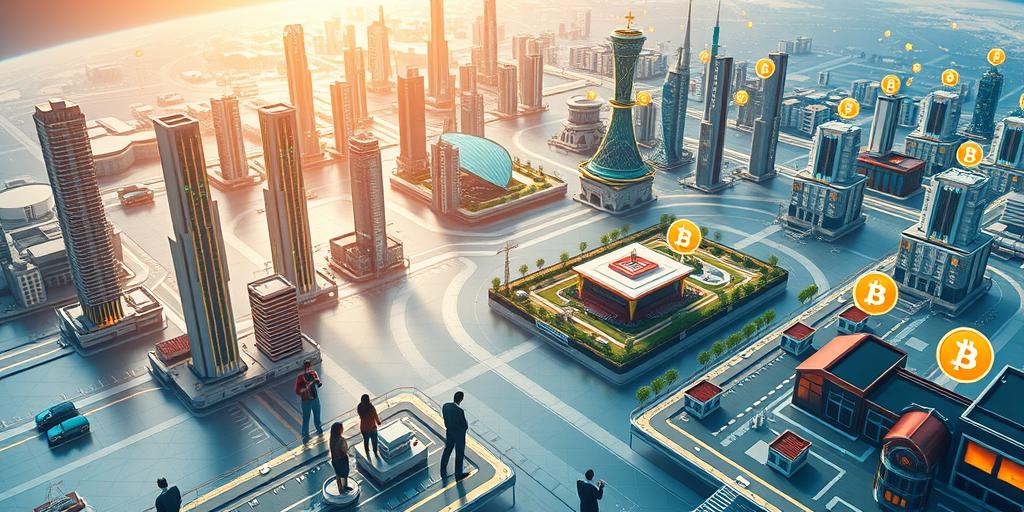The Economics of the Metaverse: Virtual Land and Assets (2025)
The metaverse, once a futuristic concept, is rapidly evolving into a tangible digital reality. By 2025, its economic impact will be undeniable, particularly in the realms of virtual land and digital assets. This post delves into the burgeoning economics of the metaverse, exploring the valuation, investment, and potential pitfalls of virtual real estate and other digital commodities.
Understanding the Metaverse Economy
The metaverse economy mirrors real-world economics, but with distinct digital characteristics. Scarcity, demand, and utility still drive value, but these factors are shaped by virtual experiences, community dynamics, and technological advancements. Unlike physical assets, metaverse assets are often infinitely reproducible, yet their value is maintained through artificial scarcity, blockchain technology, and community consensus.
Virtual Land: The New Frontier
Virtual land represents parcels of digital space within metaverse platforms. Users can purchase, develop, and monetize these spaces. Several factors influence the value of virtual land:
- Platform Popularity: Land within highly populated and active metaverses commands higher prices.
- Location, Location, Location: Just like in the physical world, prime locations (e.g., near popular venues or hubs) are more valuable.
- Utility: Land that offers practical applications (e.g., hosting events, advertising, commerce) is highly sought after.
- Development Potential: The ability to customize and build on the land significantly increases its value.
The Rise of Digital Assets
Beyond virtual land, a wide array of digital assets is shaping the metaverse economy:
- NFTs (Non-Fungible Tokens): Unique digital items representing ownership of art, collectibles, in-game items, and more. NFTs provide verifiable scarcity and provenance.
- Cryptocurrencies: Used for transactions within metaverse ecosystems, facilitating trade, investment, and rewards.
- Virtual Real Estate Development: Companies are emerging that specialize in designing and constructing buildings and experiences on virtual land, further driving the economy.
- Avatars and Wearables: Customizable avatars and digital clothing represent a significant market, with users investing in unique digital identities.
Investment Strategies in the Metaverse
Investing in the metaverse requires careful consideration and due diligence. Here are some potential strategies:
- Direct Land Acquisition: Purchasing virtual land with the intent to develop, lease, or resell.
- NFT Portfolio Building: Collecting and trading NFTs with potential for appreciation.
- Metaverse-Related Stocks: Investing in publicly traded companies involved in metaverse development, technology, or infrastructure.
- Virtual Real Estate Development: Partnering with or investing in companies specializing in building virtual experiences.
Risks and Challenges
Despite the immense potential, the metaverse economy is not without risks:
- Volatility: Digital asset values can fluctuate dramatically, leading to significant losses.
- Regulatory Uncertainty: The legal and regulatory landscape surrounding the metaverse is still evolving.
- Platform Dependence: The value of assets is tied to the success and longevity of specific metaverse platforms.
- Security Risks: Vulnerabilities to hacking, fraud, and theft are prevalent in the digital realm.
The Future of Metaverse Economics
By 2025, the metaverse economy will likely be more integrated with the physical world, blurring the lines between digital and physical commerce. Expect to see:
- Increased Institutional Investment: Large corporations and financial institutions entering the metaverse space.
- Enhanced Interoperability: Greater connectivity between different metaverse platforms, allowing for seamless asset transfer.
- Sophisticated Valuation Models: More accurate and reliable methods for assessing the value of virtual assets.
- Wider Adoption: Mainstream consumers embracing the metaverse for entertainment, commerce, and social interaction.
Conclusion
The economics of the metaverse represent a significant paradigm shift, offering new opportunities for investment, creativity, and social interaction. As the metaverse continues to evolve, understanding its economic principles and potential pitfalls is crucial for navigating this exciting new frontier. By 2025, the metaverse will be a force to be reckoned with, reshaping the way we live, work, and play.
